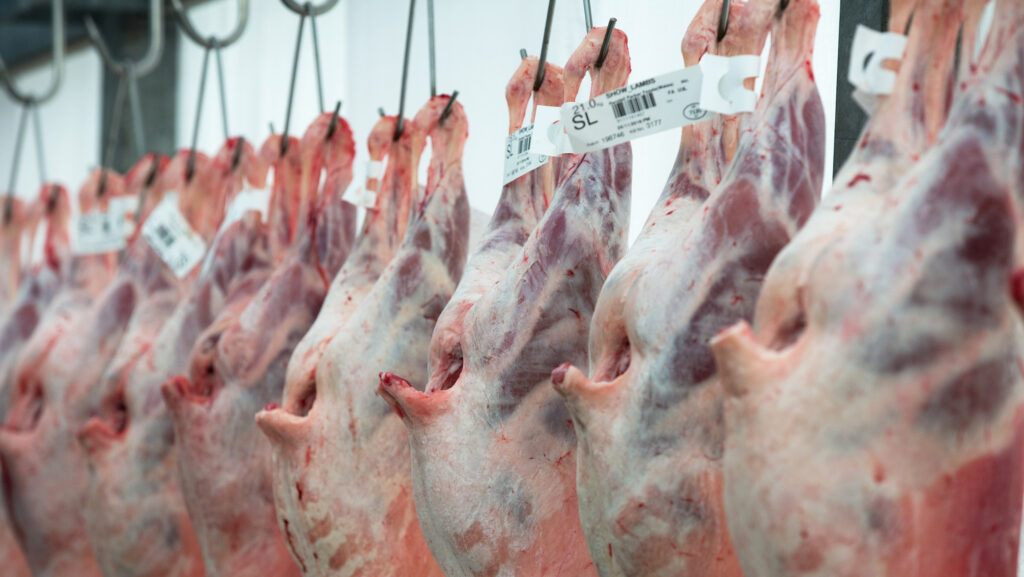Retailers divided on support for British lamb this Easter
 © Tim Scrivener
© Tim Scrivener As Easter approaches – a key time for lamb sales – questions are being raised over whether UK supermarkets are truly supporting British sheep producers amid a rising tide of cheaper lamb imports from Australia and New Zealand.
With British lamb facing pressure from international competition, consumers are turning a critical eye to where their Easter roast is coming from.
Leading the charge in championing home-grown lamb is Waitrose, which continues to offer 100% British lamb across all its own-label ranges – including fresh, frozen and ready meals – all year round.
See also: Hogg prices ease as more spring lambs come forward
The retailer says it has made British lamb a focal point of its Easter campaign, promoting traditional roast recipes online and offering discounts on whole and half legs of lamb until 22 April.
“We’re proud to sell 100% British lamb all year round, all of which is reared to our higher welfare standards,” said Jake Pickering, head of agriculture at Waitrose.
“With searches for ‘Easter lamb’ up by nearly 150% on Waitrose.com, we know our customers are hungry for a lamb centrepiece.”
M&S told Farmers Weekly it sources 100% of its fresh lamb from British farms all year round and does not sell any frozen lamb.
The Co-op has also confirmed its commitment to British farmers, stating all of its own-brand lamb is “100% British, always”.
Sainsbury’s, which sources 100% British lamb for its premium Taste the Difference and SO Organic ranges, acknowledges it does import lamb from New Zealand at times to maintain supply and offer value to customers.
The retailer says it works with more than 5,000 British farmers throughout the year, but balances this with imported meat when needed.
Tesco stance
Tesco, the UK’s largest supermarket, also highlights its support for domestic agriculture through its Tesco Sustainable Lamb Group, which supplies its Finest and Organic lamb.
While much of its lamb is British, Tesco admits it occasionally sources from New Zealand to ensure availability.
“We are a leading supporter of the thousands of British farmers we work with year-round to provide our customers with quality, affordable British produce,” a Tesco spokesperson said.
Asda position
An Asda spokesperson said: “We understand the importance of providing British produce for our customers – which is why we have local lamb ranges on sale in both Wales and Northern Ireland stores.
“This remains true this Easter time, where we have British lamb options on our shelves alongside lamb sourced from New Zealand. This mix of sourcing helps us balance demand for different cuts of lamb across the year and is not uncommon across retailers.”
Aldi says the majority of its lamb products are British.
In a press release on 8 April, Aldi said it will be officially selling the UK’s cheapest whole leg of lamb this Easter in its stores from 14 April “for as little as £6.15/kg”. It is not clear where this lamb is being sourced.
Lidl had not responded to Farmers Weekly’s request for information.
In 2025, the UK can import 114,205t of New Zealand sheepmeat and goatmeat at zero duty under a World Trade Organisation tariff rate quota, part of a post-Brexit trade agreement with New Zealand.
This quota is managed by the New Zealand Meat Board.
Industry reaction
Commenting on the latest situation on retailer lamb sourcing decisions, Phil Stocker, chief executive of the National Sheep Association, said: “While some supermarkets continue to blend imported and domestic lamb it’s also really encouraging to see others, such as Waitrose, M&S, and Co-op, stand out for their unwavering support of British lamb.
“They are making domestic supply chains work and that is of clear benefit to British sheep farmers, and in the long-term interest of retailers and consumers and others in the supply chain.
“Supporting British farmers and buying high-quality British lamb with good environmental and welfare credentials is something that may well resonate with ethically-minded consumers this Easter.”
NFU Livestock Board chairman David Barton said: “British lamb has a well-deserved reputation for sustainability and it’s heartening to see that reflected in the choices of some retailers.
“It’s vital that consumers are aware of the value of supporting British farmers, as this helps to ensure the long-term sustainability of our farming industry and the resilience of our food supply chain.
“Choosing British lamb is an investment in both the future of UK farming and the high standards of animal welfare we uphold in this country.”
